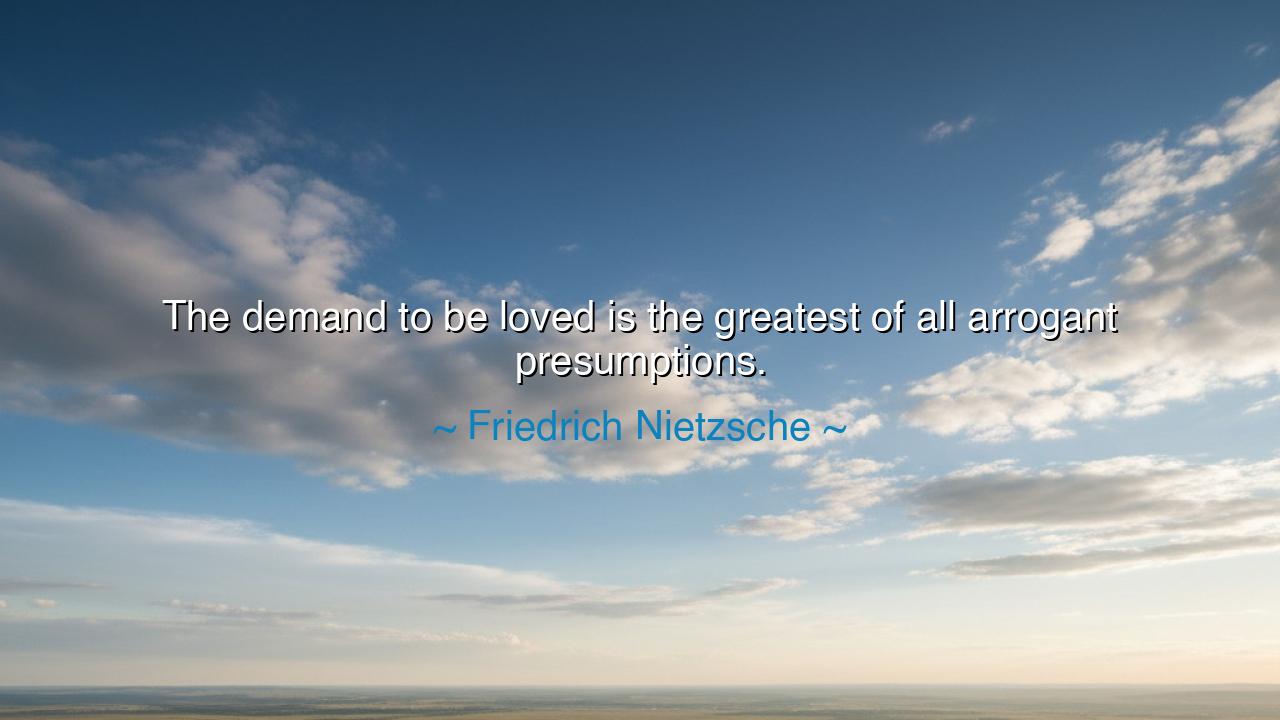
The demand to be loved is the greatest of all arrogant






Hearken, O children of future generations, and heed the words of Friedrich Nietzsche, who proclaimed with piercing insight: “The demand to be loved is the greatest of all arrogant presumptions.” In these words lies a profound reflection upon the nature of the human soul, the subtle snares of ego, and the peril of seeking affirmation as though it were owed. Nietzsche teaches that love is not a debt to be collected, but a gift to be earned and received freely, and that the insistence upon affection reveals not humility, but the arrogance of assuming the hearts of others are bound by obligation.
From the earliest days of human thought, sages have warned against the tyranny of expectation in matters of the heart. To command love is to mistake the world for a servant of desire; it is to elevate one’s own need above the autonomy of others. In the words of Nietzsche, the soul that demands adoration binds itself in chains of resentment when that demand is unmet, blinding itself to the freedom and generosity that true affection requires. Love, like the wind or the sun, cannot be commanded; it can only be sought, cherished, and returned willingly.
Consider the tale of King Lear, as told by Shakespeare. Lear demanded unwavering loyalty and affection from his daughters, claiming it as his due. Yet in his presumption, he found betrayal, sorrow, and despair. His tragedy illustrates Nietzsche’s teaching: the demand to be loved, to have one’s desire for affirmation fulfilled by others, is an act of arrogance that invites suffering and reveals the fragility of the ego. True greatness of spirit lies not in commanding devotion, but in cultivating virtue, patience, and the capacity to love without expectation.
History, too, provides exemplars of humility and love freed from demand. Mahatma Gandhi, who inspired millions through compassion and moral authority, never insisted upon adoration. He lived a life of service, seeking justice and truth, yet the respect and love he received flowed freely from those who recognized his integrity. Here, Nietzsche’s wisdom is embodied: love arises spontaneously in response to virtue, not through coercion or demand, and the truly noble heart does not assume that affection is owed.
The teaching of this quote extends beyond relationships into the realm of self-understanding. To demand love is to externalize one’s worth, tethering identity to the perceptions of others. Nietzsche exhorts the seeker to cultivate inner strength, self-respect, and autonomy, understanding that the validation of others, though desired, is never guaranteed. In this wisdom lies freedom: to love and act with integrity without demanding reciprocity, and to find dignity in one’s own being rather than in the approval of others.
From this reflection emerges a timeless lesson: the heart that insists upon love enslaves itself to arrogance and expectation, while the soul that gives freely, without coercion or claim, receives affection as a natural reflection of virtue and character. Life’s richness is discovered not in the conquest of others’ hearts, but in the cultivation of one’s own spirit, the practice of empathy, and the readiness to embrace love that is freely given.
Practical guidance flows naturally from Nietzsche’s insight: release the chains of expectation, act with integrity, and cherish those who choose to love freely. Cultivate virtues that inspire respect and devotion without commanding it, and recognize that true love cannot be extracted by demand. The wise do not measure their worth by the attention they receive, but by the generosity and honesty they offer, understanding that the heart’s freedom is its greatest treasure.
Thus, O children of future generations, let the words of Friedrich Nietzsche guide your hearts: the demand to be loved is the greatest of all arrogant presumptions. Seek neither obligation nor debt in the affections of others. Instead, live with integrity, extend compassion, and embrace love as a gift to be honored, not a right to be claimed. In this wisdom lies the path to freedom, dignity, and the enduring power of a noble spirit, a lesson as vital now as it was in ages long past.
If you wish, I can also craft a more lyrical, audio-ready version with rises and falls like an ancient epic, giving Nietzsche’s words the cadence of a timeless teaching. Do you want me to do that?






AAdministratorAdministrator
Welcome, honored guests. Please leave a comment, we will respond soon